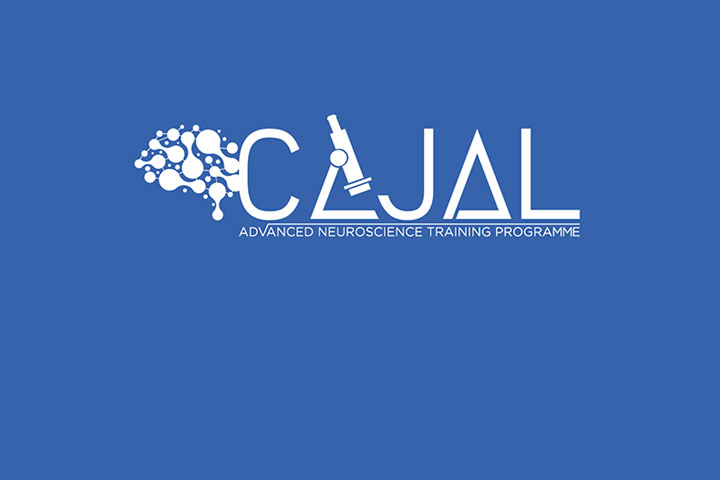
2026 Cajal Courses at the Bordeaux School of Neuroscience
The Bordeaux School of Neuroscience will host 4 Cajal courses in 2026. Here is the program! Applications are not open yet. Follow the Cajal program or the Bordeaux Scholl of Neuroscience on social networds not to miss them!
Frontiers in Neural Organoids Modelling
13 April – 1 May 2026
The course provides advanced training into the field of neural organoids for the modeling of brain development and physiopathology. Neural organoids, three-dimensional models derived from human pluripotent stem cells, have been revolutionizing the study of the human brain and its disorders by recapitulating key steps of human brain development including neural stem cells patterning, expansion, differentiation and connectivity. Moving beyond a basic introduction, this intensive course will focus on emerging frontiers research directions, equipping the next generation of neuroscientists with cutting-edge frontier know-how.
The course emphasizes an integrative, hands-on approach that bridges the gap between theoretical knowledge and practical applications by combining experimental and computational methods. Participants will gain a sophisticated theoretical framework and the practical insights to pursue the frontiers of neural organoid modelling in their own research.
Course directors
Giuseppe Testa
University of Milan and Human Technopole, Italy
Flora Vaccarino
Yale University, USA
Scientific Directors
Nicolò Caporale
University of Milan and Human Technopole, Italy
Soraya Scuderi
Yale University, USA
Emanuele Villa
Human Technopole, Italy
Neuromics – Single-Cell and Spatial omics in the Nervous System
22 June – 10 July 2026
The field of neuroscience is undergoing a revolutionary transformation through the integration of cutting-edge genomic technologies with traditional neurobiological approaches. Single-cell and spatial genomics are unveiling unprecedented molecular insights into nervous system development, function, and disease, fundamentally changing our understanding of neural circuits and brain organization.
This intensive three-week course provides comprehensive hands-on training in state-of-the-art “neuromics” technologies, combining theoretical foundations with practical experience in single-cell genomics, spatial transcriptomics, and multi-omics approaches specifically applied to the nervous system. Participants will gain expertise in experimental design, data generation, computational analysis, and biological interpretation of high-throughput genomic datasets from neural tissues.
The course integrates lectures from world-leading scientists with intensive laboratory work, enabling participants to master both experimental protocols and computational pipelines essential for modern neuroscience research. Through collaborative projects, students will explore applications ranging from neural development and cell type identification to disease mechanisms and therapeutic targets.
Course directors
Gioele La Manno
Brain Mind Institute, School of Life Sciences, École Polytechnique Fédérale de Lausanne, Switzerland
Hannah Hochgerner
Department of Biotechnology and Food Engineering, Technion – Israel Institute of Technology, Haifa, Israel
Alexandre Favereaux
Interdisciplinary Institute for Neuroscience (IINS), CNRS, Université de Bordeaux, France
The Neurovascular Unit and Beyond – How CNS Border Sites Dynamically Regulate Brain Homeostasis
28 Sept – 16 Oct 2026
We are excited to announce a new 2026 Cajal Course to be focused on the CNS Borders and Barriers: ‘The Neurovascular Unit and Beyond – How CNS Border Sites Dynamically Regulate Brain Homeostasis.’ This topic could not be more topical at the present moment. Recent years have literally seen an explosion of foundational work on the CNS barrier / interface / border sites (Badaut et al. FBCNS, 2024). Today, we have an increasingly complex and nuanced understanding of the transcriptomics, anatomy, and functional correlates of these different interfaces. This knowledge has fueled a dramatic increase in translational applications (e.g. delivery approaches for biotherapeutics and small molecules) as well as an ongoing vigorous discussion about several aspects of the CNS border sites within the field.
We are now on the cusp of several new therapeutic approaches being fully translated into the clinic (e.g. Alison Abbott: Breaking down barriers in brain-drug research. Nature, 29 May 2025), in part due to a more complete understanding of neurovascular unit, choroid plexus, and leptomeningeal biology. Better appreciation of the physiology of brain fluids (cerebrospinal fluid, interstitial fluid) has also been informing much more sophisticated interpretation of biomarkers (e.g. neurofilament light chain) that increasingly underlie the monitoring of disease progression and responses to therapy. Finally, the large body of recent clinical (and pre-clinical) therapeutic CNS-directed work is in turn facilitating a more sophisticated reconsideration of the CNS border sites, allowing us to better comprehend critical physiological processes, species differences, and even evolutionary aspects related to brain homeostasis. It is an incredibly exciting time for the field! This course will explore these scientific areas with world class keynote lectures and laboratory modules led by a number of dynamic instructors at the forefront of the field.
Course directors
Jerome Badaut
CNRS – University of Bordeaux, France
Robert G. Thorne
Denali Therapeutics, South San Francisco, California, USA
University of Minnesota-Twin Cities, USA
Past President, International Brain Barriers Society
Neurobiology of Sleep
19 Nov – 8 Dec 2026
This inaugural Cajal Course on Neurobiology of Sleep offers a comprehensive overview of current knowledge, and existing gaps, in sleep regulation and its functions, and the dynamics of brain activity during sleep across species. World-leading experts in the field will guide participants through the latest advancements.
The course features hands-on training across a variety of cutting-edge approaches, including:
• In vivo calcium imaging
• Large-scale molecular measures
• Human high-density EEG recording
• Wearable technologies for sleep monitoring
• Electrophysiological recordings
• Advanced analysis of big data
• Computational modelling
• Comparative approach with a diversity of animal models
By applying these diverse techniques to sleep research, participants will significantly advance their knowledge in sleep science and master a wide array of advanced tools and methodologies.
Course directors
Carolina Gutierrez Herrera
University of Bern, Switzerland
Arthur Leblois
CNRS – University of Bordeaux, France
Julie Seibt
University of Surrey, UK
About Cajal courses
https://cajal-training.org/courses/
Last update 18/12/25
